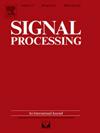阵列元失效情况下双基地MIMO雷达角度估计的抗离群贝叶斯张量补全
IF 3.4
2区 工程技术
Q2 ENGINEERING, ELECTRICAL & ELECTRONIC
引用次数: 0
摘要
传统的多输入多输出(MIMO)雷达角度估计算法容易受到阵列元件失效和脉冲噪声的影响,这使得在实际应用中实现准确的估计具有挑战性。为了解决这个问题,我们提出了一种抗离群值的贝叶斯张量补全算法,用于元件失效和脉冲噪声下双基地MIMO雷达的出发方向(DOD)和到达方向(DOA)联合估计。首先,我们构建了一个被异常值破坏的缺片张量信号模型。为了在这个张量上实现更好的低秩正则化,我们将它转换成一个随机缺失项的结构化张量。然后,我们设计了一个抗离群值贝叶斯张量补全模型,该模型考虑了阵列元件失效和脉冲噪声的“重尾”性质。在该模型中,缺失条目的重建表示阵列元素失效,而Student-t分布表示测量中的脉冲噪声。提出了一种变分贝叶斯推理方案来解决所提出的模型,该方案在估计因子矩阵、恢复张量秩和减轻脉冲噪声之间交替进行。最后,利用位移不变性技术,利用完成的因子矩阵提取DODs和doa。仿真结果验证了该算法在单元失效和脉冲噪声下对目标数和目标角度的估计性能。本文章由计算机程序翻译,如有差异,请以英文原文为准。
Outlier-resistant Bayesian tensor completion for angle estimation in bistatic MIMO radar under array element failures
Conventional angle estimation algorithms for multiple-input multiple-output (MIMO) radar are susceptible to array element failures and impulsive noise, which makes achieving accurate estimates in practical applications challenging. To remedy this, we propose an outlier-resistant Bayesian tensor completion algorithm for joint direction-of-departure (DOD) and direction-of-arrival (DOA) estimation in bistatic MIMO radar under element failures and impulsive noise. First, we constructed a slice-missing tensor signal model that is corrupted by outliers. To achieve better low-rank regularization on this tensor, we convert it into a structured tensor with randomly missing entries. We then design an outlier-resistant Bayesian tensor completion model, which accounts for array element failures and the "heavy-tailed" nature of impulsive noise. In the proposed model, the reconstruction of missing entries represents array element failures, while Student-t distribution models the impulsive noise in the measurements. A variational Bayesian inference scheme is developed to address the proposed model, which alternates among estimating the factor matrices, recovering the tensor rank, and mitigating impulsive noise. Finally, the completed factor matrix is used to extract DODs and DOAs using the shift invariance technique. Simulation results confirm the outstanding performance of the proposed algorithm in estimating target numbers and angles under element failures and impulsive noise.
求助全文
通过发布文献求助,成功后即可免费获取论文全文。
去求助
来源期刊

Signal Processing
工程技术-工程:电子与电气
CiteScore
9.20
自引率
9.10%
发文量
309
审稿时长
41 days
期刊介绍:
Signal Processing incorporates all aspects of the theory and practice of signal processing. It features original research work, tutorial and review articles, and accounts of practical developments. It is intended for a rapid dissemination of knowledge and experience to engineers and scientists working in the research, development or practical application of signal processing.
Subject areas covered by the journal include: Signal Theory; Stochastic Processes; Detection and Estimation; Spectral Analysis; Filtering; Signal Processing Systems; Software Developments; Image Processing; Pattern Recognition; Optical Signal Processing; Digital Signal Processing; Multi-dimensional Signal Processing; Communication Signal Processing; Biomedical Signal Processing; Geophysical and Astrophysical Signal Processing; Earth Resources Signal Processing; Acoustic and Vibration Signal Processing; Data Processing; Remote Sensing; Signal Processing Technology; Radar Signal Processing; Sonar Signal Processing; Industrial Applications; New Applications.
 求助内容:
求助内容: 应助结果提醒方式:
应助结果提醒方式:


